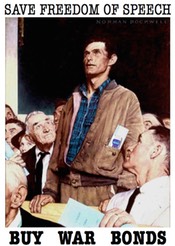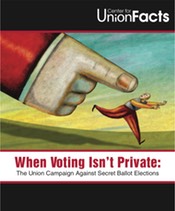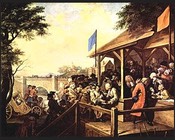A little contemporary 'fair use' of Norman Rockwell's 'Freedom of Speech' as modified for our 21st century town meeting. (See the electronic voting keypad in the man's pocket.)
In 1943, during World War II, Rockwell created his 'Four Freedoms' series which was inspired by a speech given by Franklin D. Roosevelt. It turns out that this town meeting attendee wasn't standing up to show his vote. He was standing up to speak publically about his opinion on a particular issue yet to be voted on. (Today, we can do that at the PRO/CON/Procedural microphones.) When that man wanted to vote, back then in 1943, he had to shout or stand or raise a hand so that he could be counted in clear view of all other town meeting attendees. His vote was not private. But this contemporary modification of Rockwell's iconic poster still allows that man, (along with all other town meeting attendees), to speak in public about how he feels on a particular subject but then vote with the freedom of privacy. In 1943, we fought against a tyrannical power which did not permit the freedom of speech or the freedom to vote with free will.
As the vast majority of Wayland's town meeting has demonstrated through their private, town meeting vote tallies; if Mr. Rockwell's man could have voted in private without a meeting time compromise then they would have grabbed at that chance. In Wayland, you can grab at that chance. Its right in the pocket of that man.
What is pure democracy?
This question is open to opinion and definition but this site will define it as applied to New England town meeting.
• All people who are eligible to vote are allowed to vote if they so choose to.
• All people who vote have their vote counted accurately and equally.
• All people who vote may do so in secret to be free of any outside influences either before, during or after the fact.
The closer we can get to these three points, the closer town meeting gets to being a pure democratic condition of voter participation.
The town of Acton’s STM on 6/3/13 held a ‘paper ballot’ vote and you can see it at this link. The secret ballot starts at about 1:30 and last for about 1 hr. When you watch it you can see the time, effort and problems associated with performing secret paper ballots. In Wayland, we can do this secret vote in 60 seconds - everytime - every vote !
Does voter intimidation exist?
Voter intimidation, when it exists, exists on a personal level. Only you can know if you are influenced in your open voting by other people watching you. It has been widely reported that voters have been influenced through lack of voting privacy by employers, unions, relatives, friends, social groups or town employees. Voter intimidation will affect the vote and it is a real phenomenon that has no place in a pure democracy. Throughout history, people who have not have their voting privacy, have been threatened (either real or imagined), heckled, harassed, robbed of their livelihood and in extreme cases of phony-democratic states around the world; they have had their lives threatened.
The fact is that when people have voting privacy then we get the real vote. We get the true vote. We get the vote that allows one to vote with their hearts, their minds and their pocketbooks.
Because voter intimidation is a very personal condition - rarely can one precisely document its existence. But this documentation does exist and it did occur on a major spending article in Wayland's town meeting on November 9th, 2009. This event was captured on film to be known as the Reconsideration of Article 2. which requested a re-vote using a secret 'paper-ballot'. (Also note the moderator's objection to the sound quality and further notice the audience's continued intimidation through their cheers and applause upon hearing the objection.)
Another recorded proof occured at the April 2011 town meeting (Article 22 - the free electronic voting trial acceptance), when a government housing official spoke up (at the CON microphone) against the privacy that electronic voting would provide. "Affordable housing is an unpopular subject" … "not found of the duplicity of people saying one thing and voting another - anonymously".
Wireless electronic voting brings the privacy that you already have at the polls, (which was instituted in the US by Massachusetts around just after 1852), into New England town meeting. For all of the reasons why you demand your voting privacy at the polls. All of these all apply to the voting privacy you can now have at Wayland's town meeting through the use of this wireless keypad technology.


